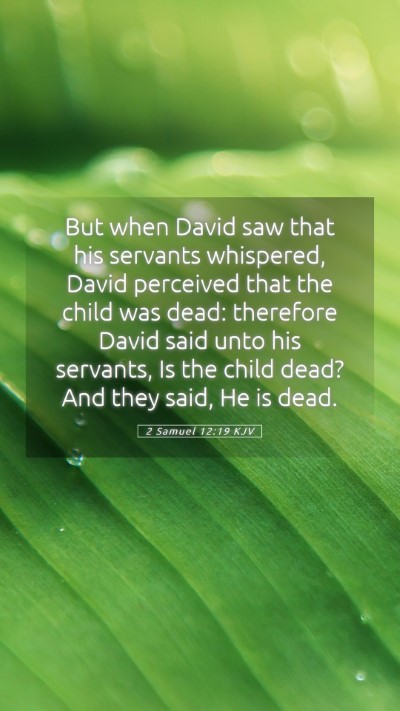Bible Verse Commentary: 2 Samuel 12:19
The verse 2 Samuel 12:19 states:
"But when David saw that his servants whispered, David perceived that the child was dead: therefore David said unto his servants, Is the child dead? And they said, He is dead."
This moment in the narrative of David's life captures a profound emotional and spiritual turning point. Insights from various public domain commentaries illuminate the complexities of this scene, emphasizing the themes of grief, repentance, and the consequences of sin.
Summary of Commentary Insights
-
Understanding Grief: Matthew Henry notes that David's perception of his child's death reveals the deep connection he had with the child, which is further accentuated by the grieving nature of his servants. This depicts how loss profoundly impacts not just the individual but also the community around them.
-
The Weight of Sin: Albert Barnes highlights the importance of context—David's sin with Bathsheba led to serious consequences, including the death of the child. This serves as a reminder of the weight of sin and the divine justice that often follows such actions.
-
David’s Leadership: Adam Clarke reflects on David's role as a king and father. His question to the servants about the child’s status suggests a leader's burden, indicating that his personal life was intertwined with his responsibilities to the nation.
Exploring the Themes
The themes within 2 Samuel 12:19 extend beyond the immediate context, serving as a focal point for broader discussions within Bible study groups and for individual understanding. The verse emphasizes:
- The Acceptance of Loss: David's inquiry about the child’s wellbeing demonstrates a step toward acceptance, which is crucial in the grieving process.
- Consequences of Actions: This situation reflects the inevitable outcomes that stem from our actions, prompting readers to contemplate their own lives and decisions.
- The Role of Support: The whispering amongst servants signifies the communal aspect of grief, highlighting the need for support during trying times.
Application to Daily Life
Understanding 2 Samuel 12:19 can be immensely beneficial in real-life applications. It teaches that:
- Recognizing the weight of our decisions can lead to more thoughtful and conscientious living.
- Grieving is a normal process that one should navigate with help, and one should not shy away from seeking support.
- Leadership often requires facing uncomfortable truths directly, and asking the hard questions is part of the responsibility.
Related Cross References
- 2 Samuel 12:15: Context of the child's illness as a consequence of David's actions.
- Psalm 51: David's heartfelt repentance echoes the themes of sin and forgiveness.
- 1 Chronicles 21:17: Acknowledgment of personal sin and responsibility as a leader.
Conclusion
In bringing together various commentaries, we understand that 2 Samuel 12:19 serves as a critical reminder of the complexities of human emotion, the weight of sin, and the paths we must navigate through grief. It encourages deeper engagement with the text through Bible study insights that aid in personal growth and spiritual maturity.
Further Exploration
For those looking to dive deeper into scripture analysis beyond this verse, consider exploring themes of redemption and grace in David's story, as well as examining other instances of sin and consequence in both the Old and New Testaments. Utilizing Bible study resources such as commentaries, coordination with Bible study groups, and online study courses can enhance understanding and application of these significant biblical teachings.
Call to Action
As you continue your journey in understanding Scripture, always seek to apply its lessons to your everyday life. Consider how the implications of 2 Samuel 12:19 echo in your experiences and how the wisdom of biblical exegesis can guide you through life's challenges.


